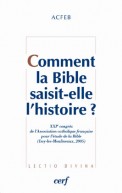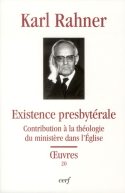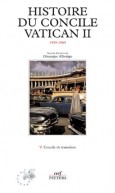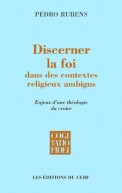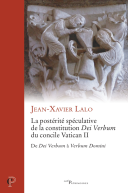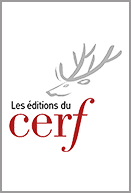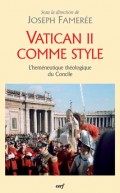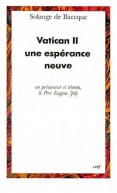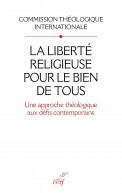
Dans les traces... de la constitution Dei Verbum du concile Vatican II - CF 270
Collection Cogitatio Fidei - N° 270
208 pages - oct. 2009
26,40€
Ce n'est qu'au concile Vatican II (1962-1965) qu'une théorie globale fut élaborée sur les Écritures et leur lecture critique et théologique. C'est même l'enjeu principal de la constitution « Dei Verbum » sur la Révélation divine et sa transmission, préoccupée notamment du rôle spécifique de l'exégèse historique dans l'ensemble du processus d'interprétation des écrits bibliques, tant du Premier que du Second Testament. Or, au cours des quarante-cinq ans écoulés, tant l'exégèse biblique que le rapport à la Bible en Occident ont considérablement évolué. La Bible n'est plus seulement considérée comme livre de l'Église mais aussi comme objet culturel singulier, matriciel de la culture européenne, objet, à ce titre, de types d'intérêts et d'études fort divers. C'est dans ce contexte nouveau, tout à la fois postconfessionnel et pluridisciplinaire, que Christoph Theobald inscrit sa contribution à une lecture actualisée de la constitution « Dei Verbum » et à tous les problèmes qu'elle suscite aux plans épistémologique, culturel, théologique et pratique. Selon le plan même du document conciliaire, il traite de la Révélation et de la tradition ; ensuite dans une perspective qu'il qualifie lui-même « de réception », il aborde l'inspiration des Écritures et leur rapport à la théologie chrétienne, puis le concept d'histoire du Salut à partir des propos de « Dei Verbum » sur l'Ancien Testament. Traitant des Évangiles, il s'intéresse à la pédagogie du Christ et revient enfin sur les diverses lectures des Écritures (extraliturgique et liturgique) et les liens qu'elles peuvent entretenir. La conclusion reprend l'épineuse question des sens de l'Écriture, notamment à la lumière du récent synode romain sur La Parole de Dieu dans la vie et la mission de l'Église.
--
Only at the Vatican II council (1962-1965) was a global theory on the Scriptures and their critical and theological reading established. Indeed, it was the principal challenge of the ‘Dei Verbum’ constitution on the Divine Revelation and its transmission, with special attention given to the specific role of historical exegesis in the ensemble of interpretive techniques for biblical writings, First or Second Testament. But over the last forty-five years, biblical exegesis and the relation to the Bible in the West have considerably evolved. The Bible is not only considered as a book of the Church but also as a unique cultural object, a matrix of European culture, thus the object of a great variety of interests and studies. In this new context, both post-confessional and multi-disciplinary, Christoph Theobald makes his contribution to an updated reading of the ‘Dei Verbum’ and all the problems it creates from the epistemological, cultural, theological and practical viewpoints. Even in the plan of the conciliar document, it treats Revelation and tradition; then - in a perspective it calls ‘of reception’- it approaches the inspiration of the Scriptures and their relation to Christian theology; then the historical concept of Salvation based on what ‘Dei Verbum’ has to say about the Old Testament. In reference to the Gospels, it focuses on the teaching of Christ and finally revisits the various readings of the Scriptures (extra-liturgical and liturgical) and the links between them. The conclusion raises the tricky question of meaning in the Scriptures, especially in the light of the recent Roman synod on the Word of God in the Life and Mission of the Church.
--
Only at the Vatican II council (1962-1965) was a global theory on the Scriptures and their critical and theological reading established. Indeed, it was the principal challenge of the ‘Dei Verbum’ constitution on the Divine Revelation and its transmission, with special attention given to the specific role of historical exegesis in the ensemble of interpretive techniques for biblical writings, First or Second Testament. But over the last forty-five years, biblical exegesis and the relation to the Bible in the West have considerably evolved. The Bible is not only considered as a book of the Church but also as a unique cultural object, a matrix of European culture, thus the object of a great variety of interests and studies. In this new context, both post-confessional and multi-disciplinary, Christoph Theobald makes his contribution to an updated reading of the ‘Dei Verbum’ and all the problems it creates from the epistemological, cultural, theological and practical viewpoints. Even in the plan of the conciliar document, it treats Revelation and tradition; then - in a perspective it calls ‘of reception’- it approaches the inspiration of the Scriptures and their relation to Christian theology; then the historical concept of Salvation based on what ‘Dei Verbum’ has to say about the Old Testament. In reference to the Gospels, it focuses on the teaching of Christ and finally revisits the various readings of the Scriptures (extra-liturgical and liturgical) and the links between them. The conclusion raises the tricky question of meaning in the Scriptures, especially in the light of the recent Roman synod on the Word of God in the Life and Mission of the Church.
- Dimensions : 135x215x17
- ISBN : 9782204089869
- Poids : 290 grammes
DU MÊME AUTEUR
L'Existence presbytérale
Contribution à la théologie du ministère dans l'Église
de Karl Rahner
432 pages - oct. 2011
Histoire du concile Vatican II (1959-1965), 5
832 pages - sept. 2005
Discerner la foi dans des contextes religieux ambigus - CF 235
de Pedro Rubens
560 pages - janv. 2004
> VOIR TOUS LES LIVRES DE l'AUTEUR
DANS LA CATÉGORIE THÈMES CONTEMPORAINS
Vatican II comme style
320 pages - mai 2012
La liberté religieuse pour le bien de tous
de Commission théologique internationale
192 pages - nov. 2019

